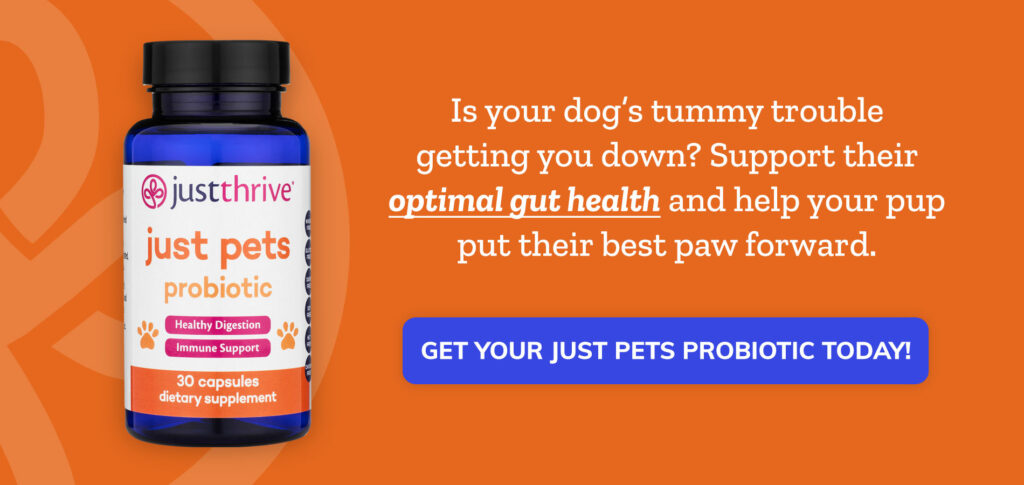Table of Contents[Hide][Show]
Your pet’s immune system is responsible for keeping them healthy.
And that’s no small feat, considering how much time most pets spend sniffing, licking, and even eating everything in sight!
To counter some of these natural tendencies (or rather the exposure to pathogens that come with them), your pet’s immune system is hard at work 24/7 keeping them healthy.
Let’s take an in-depth look at your pet’s immune system and how you can support it to give your fur baby a healthy, happy life.
About Your Pet’s Immunity
A strong immune system can guard your pet from illnesses and infections, identify and eliminate bacteria and other pathogens, help with wound or post-surgery recovery, and generally keep your pet healthy, vibrant, and happy.
However, there are times when your pet’s immune system can be compromised, leaving them more vulnerable.
This can occur for a number of reasons, including:
- Recovering from a major health issue
- Not getting proper nutrition
- Inadequate amount of exercise
- Exposure to harmful toxins
- Aging, which can naturally weaken the immune system
Let’s look at the signs that these, or other factors, are disrupting your pet’s immune system.
Signs of a Weak Immune System in Pets
How can you tell if your pet’s immune system isn’t in prime condition?
Here are some tell-tale signs of a weakened pet immune system.
- Allergies
- Behavioral changes, such as depression and anxiety
- Digestive issues, including vomiting and diarrhea
- Fatigue
- General lethargy or weakness
- Frequent infections
- Loss of appetite
- Respiratory issues
- Slow healing from cuts, scrapes, and other wounds
- Skin and coat issues, including rashes, flaky skin, and a dull coat
But don’t wait until you notice these symptoms to support your pet’s immunity! Instead, keep your pet healthy by practicing immune-promoting habits all the time.
Let’s dive into the best ways to strengthen your pet’s immunity.
Related
Why Holistic-Minded Pet Parents Should Consider Pet Insurance
When I brought home my 8-week-old German shepherd puppy five years ago, I thought I knew enough about dogs and had a strong enough of an appreciation of holistic methods that I could easily raise a healthy, happy dog. I was wrong. Due to a confluence of genetics, vaccinations, environment and probably several other factors …
The Link Between Gut Health and Immunity
If you want to support your pet’s immunity, your journey starts someplace unexpected: your pet’s gut.
Just like humans, pets have a gut microbiome. This is home to the vast majority of the bacteria in your pet’s body.
Some bacteria are beneficial (or “good”) bacteria; some are pathogenic (or “bad”) bacteria. Due to the limited real estate in your pet’s microbiome, when one type of bacteria flourishes, the other type is crowded out. So the good and bad bacteria live in a precarious balance, each trying to be the dominant bacteria in the microbiome.
Ideally, the beneficial bacteria will prevail, thriving and growing in your pet’s biome and supporting their gut health, which in turn supports your pet’s overall health and well-being.
But why does your pet’s microbiome matter for immunity?
Studies show that about 70-80% of your pet’s immune system resides in their gut, emphasizing a strong link between digestive health and immunity. In other words, a properly balanced gut is essential to maintaining a strong, healthy immune system.
And, when you’re doing what you can to keep your pet healthy and encourage a healthy immune system, the best place to start is in their gut microbiome. By supporting your pet’s gut microbiome, you can lay the foundation for overall wellness, including a robust immune system.
Let’s look at the best ways to enhance your pet’s gut and strengthen their immune health.
The Best Ways to Promote Gut and Immune Health
The best place to begin supporting your pet’s immune system is with their gut health.
As we mentioned earlier, your pet’s immune system is housed in their gut microbiome. So, getting your pet’s gut in tip-top shape is the first, and possibly most important, step on the journey to a healthy immune system.
Provide a Quality Probiotic Supplement
One proven way to support your pet’s gut and immune health is with high-quality probiotics.
Probiotics are bacteria that are similar—or even identical—to the beneficial bacteria that already live in your pet’s gut microbiome.
When your pet consumes probiotics, the bacterial strains make their way down to your gut’s digestive tract and biome. There, they join forces with the colonies of beneficial bacteria, adding quality and quantity to their numbers. The problem is most probiotics can’t survive this journey.
That’s why we recommend Just Pets Probiotic, a supplement created for fur babies, and unlike other probiotic supplements, Just Pets Probiotic is scientifically verified to arrive fully alive and potent in your pet’s gut due to the spore bacteria it contains.
This potent, clinically-proven supplement contains three bacterial strains chosen to promote your pet’s gut and immune health.
- Bacillus Licheniformis (SL-307), which encourages healthy digestion and forms the full spectrum of B vitamins that support healthy skin and fur
- Bacterial powerhouse Bacillus Subtilis HU58™, which produces 12 defenders to help your pet feel—and behave—their best
- Pediococcus Acidilactici, to combat digestive issues and oral health disruptors
And it’s easy to use!
Forget about wrapping a pill in cheese, coating a capsule in peanut butter, or trying to inject a liquid into your pet’s mouth. Just open one of the capsules, sprinkle the contents over your pet’s food, and you’re all set!
Provide Healthy Food
Everything your pet consumes goes straight to their digestive system, where it can help or hinder their gut and immune health.
Animals will eat almost anything. It’s up to you to make sure they have access to healthy foods that will support their gut health.
Here are some tips:
- Read labels carefully; choose organic, minimally-processed products as much as possible. Although the exact ingredients and amounts will vary by pet, you can find pet foods that are high in vitamins, antioxidants, and other essential nutrients.
- Avoid table scraps unless they’re healthy. Your dog might love that bite of pizza crust, but it’s not a healthy snack!
Talk to your veterinarian for more specific recommendations, customized for your pet.
Related
What Is Healthy Food for Pets?
Last year’s New Year’s resolution was to make a positive change in your diet – eat more greens, less dairy and a lot less sugar. You’ve stuck to it and you look and feel great. Good job! This year, you decided to make some changes for your pets. You’ve been getting a bad feeling about …
Other Ways Support Pet Immunity
In addition to making sure that your pet gets quality probiotics and is eating healthy, here are some other things you can do to support their immunity and overall health and well-being.
Make Sure They Exercise
One of the most important things you can do to keep your pet healthy is to make sure they get plenty of exercise and movement.
For dogs, especially larger dogs, make sure they’re getting adequate walks. A quick walk to relieve their bladder will probably not be enough for most. Instead, try going for a longer walk around the neighborhood. If you run or cycle, a fast, energetic pup can join you—you’ll both get good exercise.
Other animals might not need walks, but there are other ways to make sure they get exercise. Spend time playing with them. The classic “cat chasing a laser beam” is a good way to get your kitty moving. Toys and training sessions are other ways to make sure your pet gets enough exercise.
What’s considered enough exercise? This will vary by species, breed, age, size, and other factors. Your pet’s veterinarian can give you more specific guidelines, tailored for your pet.
Keep Pets Hydrated
Adequate hydration is also important in keeping your pet healthy and supporting their immune response.
Water is essential to digestive health, aiding in flushing out toxins, nutrient absorption, digestive function, and more.
Make sure that your pet has an adequate amount of clean water available for them throughout the day. Change the water often to keep it sanitary.
If you’re taking your dog on a long walk or excursion, bring fresh water and a small drinking bowl, and make sure to take water breaks along the way.
Limit Stressful Situations
Pets get stressed out, too!
Just like humans, pets have a gut-brain axis. This is a two-way line of communication that links their brain to their gut and allows them to “talk” to one another. So the health of the gut microbiome influences the brain, and what’s happening in the brain influences gut health.
In humans, this manifests in several ways.
- When you’re stressed out or anxious, you might feel digestive distress.
- Ongoing digestive issues can cause anxiety and even depression.
In pets, it works in a very similar way. Their brains, including their mood and mental health, can impact the balance of their gut microbiome. Consequently, lowering your pet’s stress can promote their gut and immune health.
Your pet will display definite behaviors that communicate their stress. Here are some of the most common stress cues.
- Excessive or compulsive grooming
- Lip smacking
- Destructive behavior
- Hyperattentiveness
- Trembling, shivering, or shaking
- Aggressive behavior
- Excessive panting
- Excessive drooling
- Persistent barking
How can you lower your pet’s stress? Here are some ideas to avoid pet stress or soothe a stressed pet.
- Establish a consistent routine, so your pet feels stable and secure.
- As much as possible, avoid large crowds and loud noises.
- If you’re having a large group of people visiting, try to have a quiet room where your pet can relax.
- Fireworks can be incredibly stressful for dogs. Consider a “thunder shirt,” which applies gentle, soothing pressure.
Most importantly, when your pet is stressed out, spend extra time soothing them and helping them find their calm.
Avoid Environmental Toxins
Have you ever watched an animal walk across the floor, then stop and lick their paws?
While you might not be able to stop them from licking their paws—at least not easily—you can minimize the effects of this incredibly common behavior simply by using organic, non-toxic floor cleaners.
And, for this same reason above, always choose non-toxic shampoos or soaps for your pets. You never know when your pet will start grooming themselves, potentially exposing themselves to harmful chemicals.
Likewise, your pet’s bowls and toys should be washed frequently using natural, nontoxic dish soap—avoiding both germs and harmful chemicals.
Practice Pet Hygiene
Other general hygiene practices will also support your pet’s immunity.
Things as simple as regular, but not overly frequent, baths and dental care are crucial. So is keeping up with veterinarian visits, which can help catch minor issues before they snowball.
Final Thoughts
Your fur baby deserves a long, vibrant life filled with energy and resilience!
By focusing on their gut health, you’re not just promoting their digestive health. You’re also supporting a strong immune system, a robust immune response, and your pet’s overall well-being.
And you’re also ensuring that they have the defenses to face whatever comes their way—or whatever they find on the ground.
Help your pet live their best life, by nurturing their immune system from the inside out… starting in their gut.
You May Also Like…






